
Featured Blog | This community-written post highlights the best of what the game industry has to offer. Read more like it on the Game Developer Blogs or learn how to Submit Your Own Blog Post
Elegance & Engagement
A reply to the argument that game designers should focus on engagement over elegance while designing.

Extra Credits recently aired a great episode about depth and complexity in games. If you haven't watched it yet, go do so.
At the end of the video, the host made the statement that most designers hold elegance in design up as the Holy Grail of their craft (mostly true) when they should instead focus on player engagement. In this article, I hope to explain why these two concepts are in reality one and the same. I believe that elegance supports and protects the engagement level of the game.
I argue that elegant systems provide engagement.
Elegance of design
So what is elegant design? As the EC video states, elegance can be defined as the largest amount of mechanical depth with the smallest amount of complexity possible; the most beautiful, whirring machine crafted with the fewest cogs.
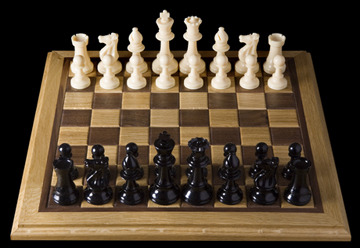
Chess provides a good balance between depth of available choices and complexity of its systems.
Chess is a game with only six different pieces with unique movement patterns, which is a very limited rule-set. The amount of choices a player can make any any one time is varied and situational, but nowhere near as deep as say, Skyrim. My father was able to teach me the basics of the game in about thirty minutes when I was young. Of course, that doesn't include the more complex manoeuvres such as en-passant, but I file that under strategy that is revealed over time, and not as the basic rule-set required to begin a session of Chess.
Yet Chess is incredibly deep (as any player can attest). The six unique pieces gain and lose value as a game progresses. Wartime strategies of feinting, baiting and trapping play out with only six movement rules.
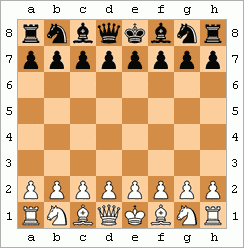
The Immortal Game
Ultimately, elegance means giving the player as many interesting choices as possible with the least amount of work. Of course, there is an amount of pride in what one can build with limited complexity, but I believe that designers regard this concept so highly simply because we want to give the player as deep an experience as we can with the tools we have.
The elegance of a game's systems ties directly into how hard the player has to work to interact with the game, and therefore (we hope) have fun. There's a steep drop off in what they player is willing to go through in order to feel like they're making the correct choices before they quit a game out of frustration.
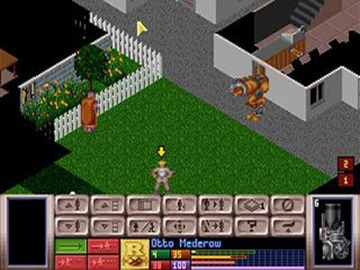
XCOM: UFO Defense
I love the original XCOM, but I found it to be extremely inelegant. I just couldn't wrap my mind around spending Time Units to complete actions. The game gave me a lot of choice up front that I just couldn't parse. Extra Credits mentions proper tutorialization being one key to solving a lot of these problems, but even WITH a tutorial, I would have had issues truly understanding what the game wanted me to.
In spite of all of that, the game's design was enjoyable enough that I kept coming back to try over and over again. Once I got the systems, I was able to lose hours in the game. Understanding the complexity brought me to the same place a more elegant design would have: engagement.
What about Engagement?
Engagement is how connected with the game the player feels at any given time. It's that state of flow, where you start laying some roads in SimCity and suddenly it's 4 AM and you have a population of 3 million. This occurs when the player doesn't feel the walls of the game boxing them in. The most engagement breaking experience is when the mechanics start fighting against what I want to do as a player.

SimCity 2000
Engagement also occurs when a player's choices lead to more choices, causing a chain reaction of events that keep the player motivated to continue interacting. In SimCity, zoning residential causes the demand for jobs to increase, which increases traffic along many of the roads. Do you as the player choose to add new roads? Install a subway? One choice cascades into multiple choices.
I probably don't need to explain why engagement is important, but I will elaborate on why keeps players playing. It really just comes down to saying 'yes' to the player as often as possible, within the established boundaries of the game. Since a game really comes down to being a bunch of rules designers put in place to allow players to make interesting decisions and enact their agency, the more decisions they get to make (and understand), the deeper the engagement. The moment the game says 'no', engagement is disrupted.
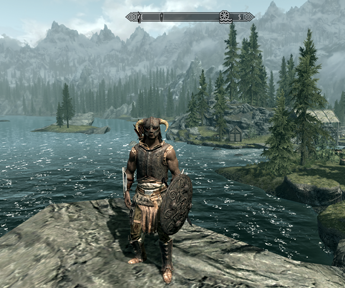
The Elder Scrolls V: Skyrim
By and large, Skyrim's systems provide a huge amount of player engagement. Sure, there are always ways to break them, but the game's ability to say yes over and over again is what puts the player in a deeply engaged state.
However, just as there is a drop off in player engagement as complexity rises, there is a similar drop off in additional player engagement as depth rises. The difference being that this drop off is one of diminishing returns. The player can only make so many decisions before the focus of the game is lost in a sea of unnecessary possibility. There are those boundaries again.
Connecting the two
Let's return to Chess for a moment. The rules of chess are pretty simple overall, so why do we not feel boxed in by the rules? We know that each piece can only move in a very limited and specific way, shouldn't we feel the limits of the game's systems rubbing up against us, breaking our engagement? Yet no one would argue that Kasparov was not 100% engaged by the game while battling the AI "Deep Blue'.
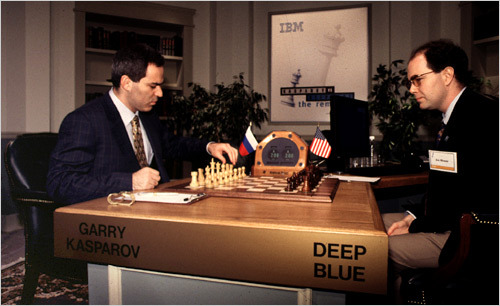
I believe the elegance of the game's mechanics allow the player to drop themselves fully into the experience. You understand exactly what the goal is, and the game provides only the tools to accomplish that goal. The barrier between player and game is only ever as thin as the complexity of the sum of the game's systems.
In the case of chess, that barrier is understanding how each piece moves. The strategy required is entirely emergent and dependent upon the opponent, a topic I'll go into in another article.
If one of the most engagement-breaking feelings is not understanding why a game is doing what it is doing, then I argue that the elegance of a game's design, and therefore the relative "thinness" of the barrier between player and game is directly tied to the engagement of the player.
More Complexity != Less Engagement
Let me clarify for a moment here. I don't think that more complexity and less abstraction necessarily increases the barrier and makes for a less engaging experience. I've found myself completely engaged in complex games such as Civilization and Crusader Kings II.
Understanding exactly what the game is doing in the background can help a great deal when understanding a system. Knowledge that the game is doing something under the hood isn't necessarily a negative quality.
If the Extra Credits episode is right, and complexity is a measure of mental work the design requires the player to do, then pulling the curtain back and letting the player see the ropes and pulleys is one way of lowering that work, and therefore the complexity.
Bringing it all together
An elegant system is one that just gets out of the player's way, and allows them to live in that state of flow, or deep engagement for as long as possible. Systems which confuse (as in my last article), provide null choices, or otherwise thwart the player all lead to a less engaging experience.
Let's compare two games on the opposite ends of the complexity spectrum. Skyrim (again) and the original Super Mario Bros.

In Mario, you do three things: run left, run right, and jump, plus sprint if you hold down the B button. That's it. Yet the game is exceedingly elegant (and therefore highly engaging) in its execution. Skyrim is far more complex, but similarly elegant, and therefore similarly engaging.
Elegance in design regardless of overall complexity is therefore the most important factor in determining engagement, as evidenced by the two games above.
While I do agree with the Extra Credits crew in their argument that designers should focus on engaging the player first and foremost, I feel confident that elegant design is a means to accomplish this goal.
You can read more of my design thoughts on my blog.
Read more about:
Featured BlogsAbout the Author
You May Also Like









